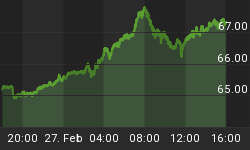With the financial markets doing their best impression of a tinderbox waiting for a spark, it is not easy to use the word 'oversold' without cracking a smile. After all, if the S&P 500 - which closed less than 1-point below its 200 DMA yesterday - was really 'oversold' it would not normally be trading only 6.4% off of its recent highs (market corrections are generally -10% and bear markets are -20%).
Needless to say, this is not a normal stock market, and these are hardly normal times. Rather, the largely secretive dealings of hedge funds control the tape, and unpredictable capital flows from central bankers and foreign investors can swing asset prices wildly about. Talk all you want about corporate America's attractive balance sheet, or those beautiful trailing P/Es, this market is controlled by unknown and volatile forces.
Incidentally, while on the topic of P/Es, isn't it amusing to see Abby Joseph Cohen go on about how attractive forward P/E multiples are given that she ignored P/Es completely when concocting her bullish biases during the late 1990s stock market mania? Apparently corporate fundamentals are important to Ms. Cohen, that is so long as everyone isn't acting like a bunch of raving lunatics (in which case she joins the party and ignores any and all of the 'fundamentals').
Regardless, amidst all the uncertainty and bailout efforts happening today, a couple of lesser covered events could make for a more volatile marketplace over the next two weeks.
More Hedge Fund Confessions?
"Wednesday marks 45 days before the end of the quarter, the deadline by which most hedge fund investors must notify the funds if they want to redeem their investments." NYT
As if hedge fund investors do not have enough to worry about, a wave of redemptions could sweep over hedge-land in the next two sessions. Does this mean more funds will announce that since NAVs are incalculable redemptions are halted? If so, market reaction to these announcements may not be favorable.
From Credit Crunch To Short Squeeze?
One item of interest not getting much play today is short selling. The uptick rule was ditched on July 6, 2007, and since then the NYSE has released only one short interest report. You guessed it, short interest hit a record high in July - its fifth monthly record in a row.

Not only does the NYSE say that this the most heavily shorted market in history (at more than $560 billion in shares short), but that more than $218 billion in short positions have been added since July 2006.

Given that the short seller's padded their positions even as stocks hit record highs earlier this year, the speculation that the shorts are going to stick around for awhile has merit. Nevertheless, there remains the possibility that the shorts were dangerously front-running the highly anticipated SEC rule change rather than making sound long-term bets against stocks. Moreover, you have to concede that with gold unable to get kick-started and central banks aggressively eying the market's liquidity situation, there exists the possibility for a short covering/relief rally from hell. Did I mention the S&P 500 ended less than 1-point below its 200 DMA yesterday? Is this not a good enough level for the Cohen's to hop back in?
A Couple of Events...
Assuming hedge fund redemptions do not slam the market first, the short selling data for August, which will be released next week, could play an important role in setting the tone for the markets leading into September. Quite frankly, at what point do even the most steadfast bears have to open up to the possibility that the tinderbox may not be overvalued stock prices, but the shorts that have made record bets against stocks?

As contrarily bullish as some of the above charts may seem, I happen to think that we are closer to a 10% correction than to a notable short covering rally. Moreover, I also think that that the blowups will outnumber the bailouts in the months ahead. In other words, while hedge fund redemption season and the actions of short sellers are two potentially big events worth talking about, remember that this market is being controlled by unknown and volatile forces, at least over the near term.
Incidentally, why all the fuss about an S&500 that has not even reached a 7% decline (or the intraday loss the S&P 500 recorded in a single session back in April 2000)? Did I mention the S&P 500 ended less than 1-point below its 200 DMA yesterday?















